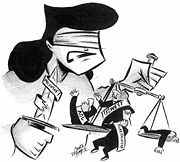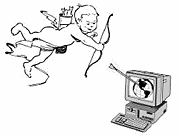Imagine how Joel Klein and the rest of the kids at the Department of Justice feel right now. They won. Microsoft lost. The case is over. The month-long postdecision celebratory drinking binge is over. Now what? Sure, it’s great to wander around DC on a sunny Tuesday, enjoying the cherry blossoms while everybody else works on their monitor-tans, but eventually the boredom sets in.
So, Joel, let me tell you from experience: The only way to stave off that feeling of ennui and meaninglessness is to throw yourself headlong into a new project. We all loved your work on the Microsoft thing, but it’s so April 3. There’s the appeals process, sure, but you’re too creative to waste your time on motions and continuations for the next 15 years. You need to branch out. With the best interests of the American consumer in mind, here are some heartfelt suggestions for your future projects.
AOL. How were these clowns allowed to get so powerful? I mean, America Online used to be like Prodigy and Compuserve, this stupid graphic BBS-thingamajig for computer idiots who didn’t know what the Internet was but wanted to do something other than play Leisure Suit Larry. Then it was a place to type dirty messages to guys posing as bored housewives. Now they’re on the cover of Time. Oh, wait, they own Time.
So what? Here’s what: America Online routinely monitors its users and has censored home pages for “objectionable” language. It has threatened litigation against the owners of Web sites criticizing the service. It’s been investigated and sued for questionable billing practices. It boasts arch-conservative Nixon and Reagan crony Alexander Haig as a director. (My god, what if he really was “in control here”?)
Most importantly, AOL has been the one of the most predatory businesses in computing for the last five years. Nobody paid attention as AOL gobbled up its primary competition, the other proprietary online services. Only Microsoft (knee-jerk reaction: evil!) objected when they snapped up ICQ, the trendy instant-messaging application with 20 million users. Everybody played along when AOL valiantly rescued Netscape from its imminent demise—never mind that Netscape Navigator had a considerably larger user base than Microsoft’s Internet Explorer at the time AOL bought it.
Now, AOL purchases one of the largest media conglomerates in the world, and nobody peeps. Of course, the special CNN/Time reports about the merger might set your mind at ease, but use your imagination and think five years down the road. When you sign up for cable modem service on most of the East Coast, you’ll find AOL as your default Internet provider. Warner Brothers (and, hey, Sub Pop!) artists will gain strange prominence on AOL’s music site, Spinner.com. You’ll call AOL-owned MovieFone and suffer through a chirpy advertisement for the Warner-produced sequel to You’ve Got Mail. The horror!
US West. I’m too young to remember exactly what sort of vile anticompetitive games AT&T used to engage in, but they couldn’t have been much worse than our local telephone monopoly’s total disregard for its customers. At least Pacific Bell, the Northern California Baby Bell often accused of monopolistic practices, seemed to want my business—they were always competent, efficient, and polite (if overpriced).
In contrast, here’s how my recent experience with US West went: I called to set up service, and they sold me an all-options-included plan without telling me that any less expensive plan existed—then neglected to turn on any of the options! I had to call them twice to set up my long distance service, perhaps because it wasn’t with one of their preferred providers. (In fact, they told me they couldn’t even find the 800 number of the long distance company I chose). They have steadfastly refused to supply me with telephone books for two weeks and have told me there is no place in the entire Seattle area to pick them up in the meantime. So I’m racking up the 411 charges. Think this nickel-and-diming isn’t intentional? Sure. Tell me that the next time you hear “That number is busy. For a charge of 75 cents, US West can continue to dial the number for you. . . .”
TicketMaster. Although I have to say, that particular service could have come in handy the last time I called USA Networks-owned TicketMaster. I’d almost forgotten why I stopped going to arena shows until I decided to brave the Gorge for the first time this summer to see one of my favorite rock dinosaurs.
Imagine my surprise when I discovered that service at the infamous concert ticket monopoly was even worse than I remembered! In addition to the busy signals, the 15 to 20 percent service charge, and the totally nonrefundable handling fee, it’s now exceptionally difficult to get through to a human being. Instead, you listen as a Stephen Hawking-style robotic voice reads unintelligible numbers that don’t match the seating chart. If you decide to brave the 30-minute wait for a real operator, you spend two-thirds of your conversation rejecting special offers. No, I really don’t want you to spam my home e-mail address with weekly announcements. Do you have to ask?
California state Senator John Burton (D-San Francisco) attempted to bring an antitrust action against TicketMaster’s Bay Area subsidiary, BASS, several times, but was never able to get sufficient government support to fight the company’s well-trained legal staff. Perhaps it’s time for a federal investigation?
Remember, Joel, antitrust legislation was not passed simply to prevent evil bespectacled billionaires from buying more than one waterfront house. It is supposed to protect against anticompetitive business practices that harm the consumer. I don’t care how much money Steve Case or Barry Diller has. I just want the choice to avoid their companies until they choose to provide decent service.
Go get ’em, tiger!






